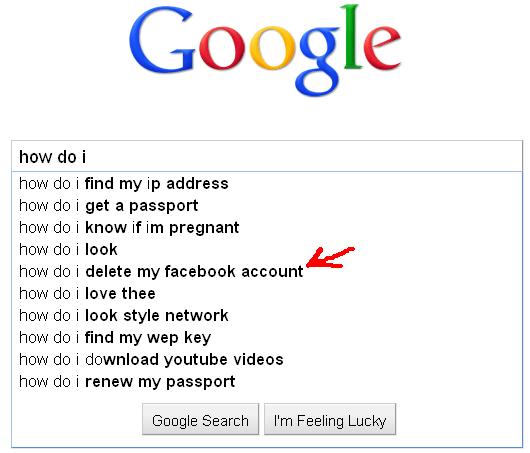Thursday, March 21st, 2019 (
No comments yet)
It looks like it didn't take long for them to get the hint. Facebook will now be improving their privacy controls and policy.
From the CNN article:

Tech blogger Robert Scoble... equated the privacy outrage to both Facebook's complicated privacy settings and the company's inability to communicate why users should share their private information with the public.

No kidding. Well now Mark Zuckerberg has admitted to making some mistakes and promises to do better. We'll see.
Tags:
Facebook,
Mark Zuckerberg
Monday, April 9th, 2012 (
No comments yet)
This is a great free tool that was put together by a volunteer who wanted to make it as easy to tell if you're protected or not as Facebook should have done themselves!
First, you go to http://www.reclaimprivacy.org/ and bookmark the link they provided (the link is actually a sophisticated little script).
The next steps are to go to Facebook and log in. Once you are in your profile, click the bookmark and the privacy scanner will go to work. You'll see a series of colored boxes that show if your settings are set to full privacy. If not, it will warn you and give you the option of fixing the setting with a single click!
As with all scripts, there is a risk of running this to both your computer and your Facebook information, but the code is open-source and has received a LOT of attention all around the web recently. I'm betting it's safe and, in my case, I've been careful not to post information that I'm worried about losing on Facebook.
In either case, there's no simpler or more effective method to tighten up your profile security that I know of so be sure to check it out!
Tags:
Facebook
Sunday, May 23rd, 2010 (
No comments yet)
Here's another great tool for understanding Facebook privacy and security. Openbook uses the programming interface that Facebook provided to the public to create a keyword search engine for Facebook.
This allows you to easily find information that many people thought was private, but wasn't. For example, this handy list of people who've cheated on their husbands:
Did this person mean to publicly declare their sexual orientation. Did that person intend to announce to the whole world that their HIV test came back positive? Do some searches of your own to find out just how easy it is to find your personal information on Facebook if you don't properly secure it (which they make pretty hard to do).
Their stated goal: "Our goal is to get Facebook to restore the privacy of this information, so that this website and others like it no longer work."
And their advertising policy: "Thanks for the offer but we're not interested in running ads at this stage. We're making a statement about the awful state of privacy on Facebook and we don't want anything to detract from that message."
This site is doing everything right. I have more respect for what they're doing and how they're doing it than I can say. For now, the only support I can give them is to promote them, but that's exactly what I intend to do! Please visit them and share them with others.
And if you happen to find something of yours or your friends' on there that shouldn't be, be sure to check out Reclaim Privacy.
You can visit them here: http://youropenbook.org/
Tags:
Facebook
Thursday, March 21st, 2019 (
No comments yet)

Facebook has found itself facing some tough choices when it comes to the direction of the company, specifically revolving around user privacy. As most Netizens know, Facebook has faced harsh criticism in recent months—which may be coming to a head after having built up slowly over the years—regarding how it handles user information. Now, the company is left deciding whether it wants to revert to its old principles and go against founder Mark Zuckerberg's policy of forging ahead, privacy be damned.

Also this:

Luckily, there are now third-party tools that help users patch up their Facebook settings, such as the incredibly helpful bookmarklet from Reclaim Privacy that lets users see what their settings are and change them automatically. These tools shouldn't be necessary, however.

The Reclaim Privacy tool is very easy to use and effective too! I haven't checked the code personally to see if it's safe, but my virus scanner didn't blip at all and I have nothing in my profile that I'm worried about sharing publicly so there was little risk. Also, since the tool is completely open-source, I'm willing to bet that someone somewhere has taken the time to look it over and would have raised a flag by now.
The author could change the code at any time, but I suspect he's legitimately trying to build attention to his website and isn't looking to quickly become tossed aside by adding attack code. Still, use at your own risk.
Lastly:

It's unlikely that such a user-friendly utopia will arrive anytime soon, though, especially given Zuckerberg's now-legendary disregard for privacy. That said, Zuckerberg was the one who called last week's company meeting to discuss the current state of Facebook privacy and user trust, so it's possible that he's beginning to warm to the idea of giving users what they want.

Source: http://arstechnica.com/tech-policy/news/2010/05/facebook-privacy-comes-to-a-head-changes-may-be-imminent.ars
If you don't know what they mean by recent privacy issues, check out these:
Facebook Secretly Adds Applications to Your Profile
10 Reasons to Quit Facebook
Finding a Name For Bully Data Practices Leads to Facebook
Senators Send Angry E-mail to Facebook Over Privacy Changes
Facebook Forces Users to Display Hometown, Work, Interests
Maybe it's because of things like that that led to this interesting result being found as a top result for Google's suggest feature:
Tags:
Facebook
Thursday, March 21st, 2019 (
No comments yet)
Wow. It seems like the last week or so, all I've talked about is Facebook! But it seems there's an awful lot to talk about! Check out what I found today:

If you visit certain sites while logged in to Facebook, an app for those sites will be quietly added to your Facebook profile. You don't have to have a Facebook window open, you don't need to signed in to these sites for the apps to appear, and there doesn't appear to be an option to opt-out anywhere in Facebook's byzantine privacy settings.

According to the source article, Facebook contacted them and told them it was a bug that has been fixed. That's the second such bug this week.
Tags:
Facebook,
Internet,
Social Networking
Thursday, March 21st, 2019 (
No comments yet)
This is awesome:
10. Facebook terms of service are completely one-sided
9. Facebook's CEO has a history of unethical behavoir
8. Facebook has flat-out declared a war on privacy
7. Facebook is pulling a classic bait and switch
6. Facebook is a bully
5. Even your private data is shared with applications
4. Facebook is not technically competent enough to be trusted
3. Facebook makes it incredibly difficult to delete your account
2. Facebook doesn't really support the open web
1. The Facebook application itself sucks
I agree so much with this. Facebook is trying to become the only provider and replace the open Internet much like AOL back in the day. I have long objected to their practices and privacy issues as well as their technical and security flaws. It would be nice if they could make moves in the right direction and become a more ethical business since the idea has a lot of potential if used properly.
The problem is I just don't see that happening. Until then, you may want to reconsider being a part of the system…just be careful when you do quit that you don't end up like this guy:
Stan tries to quit Facebook, Facebook resists
Tags:
Facebook,
Internet,
Mark Zuckerberg,
Social Networking
Tuesday, May 4th, 2010 (
No comments yet)
I just read an article online about how almost half of parents have “friended” their kids on Facebook.

many parents see the value in trying to "friend" their kids on social networks, even though it might be a bit awkward at times. According to Retrevo, most parents who are Facebook friends with their kids have teenagers—only 8 percent of parents said kids under 12 should have Facebook accounts in the first place—and they say that they learn a lot about their teens this way.

Original article here:
I agree that monitoring your child’s use of the Internet is very important and friending your kids is one way to do it. But like I just showed you, your kids can separate friends by group (real friends, school friends, my mom and dad) and then customize what your friends see by the group they’re in.
That means that your kids can post whatever they want and exclude you from it, just by adding you to a special group ("Outcasts", "Enemies", etc). For kids that are no longer living at home or have earned your trust when it comes to protecting themselves online, just friending them might be enough. Let them try to use the privacy controls to keep you out of things they don’t want you to share with you and then call them on mistakes. They’ll learn very quickly how to be careful about what they post and who can see it (a very valuable privacy skill).
But for younger kids or ones who just don’t “get it”, there’s a better way. Make use of these sites conditional based on you having their password to the account. Rather than being their friend, you can log in as them and see and control everything. In this scenario, you have the opportunity to discuss with them the things they say, do, and see in the system without them being able to restrict your visibility.
While they are quite sure to resent your presence, if you pick your battles and only get involved when you really need to (sexting, cyber bullying, weighing in on their “friends” selection, and helping them learn what information is too sensitive to post), you will likely be able to accomplish your goal of parenting without generating too much resentment.
 |  | A word of caution; this balance is very important! If you smother them too much, they’ll likely create a second account that you don’t know about and use it instead. Of course, finding out if your kids are posting online in places you don't know is a separate conversation entirely. |
Tags:
Facebook,
Parenting
Thursday, March 21st, 2019 (
No comments yet)
I found this pretty amusing:

The world needs a simple word or term that means "the act of creating deliberately confusing jargon and user-interfaces which trick your users into sharing more info about themselves than they really want to." Suggestions?
Although we didn't specifically mention Facebook in our question, … suggestions included "Zuckermining", "Infozuckering", "Zuckerpunch" and plenty of other variations on the name of Facebook's Founder and CEO, Mark Zuckerberg. Others suggested words like "Facebooking", "Facebaiting", and "Facebunk".

In the end, they went with a suggestion of "Evil Interfaces" which refers to any user interface that is designed to trick people out of their data or make them do something they don't want to do. Check out the source article for examples of the kind of "Evil Interfaces" they're talking about.
And one more thing before we go:

OK, perhaps the word "evil" is a little strong. There's no doubt that bad user-interfaces can come from good intentions. Design is difficult, and accidents do happen. But when an accident coincidentally bolsters a company's business model at the expense of its users' rights, it begins to look suspicious. And when similar accidents happen over and over again in the same company, around the same issues, it's more than just coincidence. It's a sign something's seriously wrong.

Beautifully worded.
Tags:
Data Brokering,
Facebook,
Mark Zuckerberg,
Scams - Ripoffs - Dirty Tricks,
Twitter
Thursday, March 21st, 2019 (
No comments yet)
Some US senators are not happy about the new privacy changes and have sent a letter to Mark Zuckerberg about it.

Facebook now obligates users to make publicly available certain parts of their profile that were previously private. If the user does not want to connect to a page with other users from their current town or university, the user will have that information deleted altogether from their profile.

If you read the entire letter, you can clearly see that they actually know what they're talking about. Surprising really.
Tags:
Congress,
Facebook

 Tech blogger Robert Scoble... equated the privacy outrage to both Facebook's complicated privacy settings and the company's inability to communicate why users should share their private information with the public.
Tech blogger Robert Scoble... equated the privacy outrage to both Facebook's complicated privacy settings and the company's inability to communicate why users should share their private information with the public.














